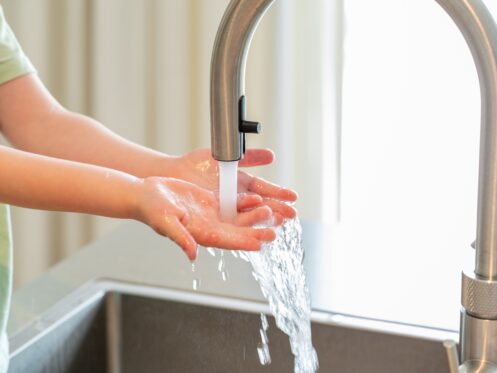Is your water heater not getting hot enough? You’re not alone. This is a common issue many homeowners face, and it can be frustrating when you expect a hot shower or need hot water for household tasks. Understanding the potential causes and solutions is important to restoring your water heater’s performance. In this article, we’ll explore common issues that might be causing your water heater to underperform and offer practical solutions. We’ll also guide you on when it might be time to consider a replacement.
How Water Heaters Work
To address the problem of a water heater not heating properly, it’s important to understand how these systems work. A water heater typically operates by heating cold water through a heat source, such as gas or electricity, and storing it in a tank until it’s needed. When you turn on the hot water tap, the heated water is delivered through your plumbing system.
For a more detailed explanation, you can refer to How Does a Water Heater Work | Water Heater Guide 2019. This resource provides a detailed look at the mechanics of water heaters, helping you better understand their operation and maintenance needs.
Common Reasons for Water Heater Not Getting Hot Enough
If your water heater is not getting hot enough, several common issues could be the cause. Understanding these can help you address the problem effectively:
- Sediment Buildup: Over time, minerals in the water can settle at the bottom of the tank, forming sediment. This buildup can insulate the water from the heating element, leading to lukewarm water. Regularly flushing the tank can help prevent this problem.
- Heating Element Failures: In electric water heaters, the heating elements can fail or become less efficient over time. If one or both elements are not working properly, the water won’t reach the desired temperature.
These issues can significantly affect your water heater’s ability to heat water properly. Addressing them promptly can help restore your hot water supply.
Troubleshooting Tips for Water Heater Not Hot
If your water heater is not providing hot water, try these troubleshooting steps before calling a professional:
- Check Thermostat Settings: Ensure the thermostat is set to the desired temperature. For most households, a setting between 120°F and 140°F is ideal.
- Inspect for Leaks: Look around the water heater for any signs of leaks. Leaks can cause water to escape, reducing the amount of hot water available.
- Look for Visible Signs of Damage: Check for any obvious signs of damage to the tank or heating elements. This could include rust or corrosion, which may indicate a more serious problem.
If these steps do not resolve the issue, it might be time to ask a professional. Ensuring safety is important, so avoid any actions that could cause harm or further damage to your water heater.
What to Do If Your Water Heater Stopped Working
If your water heater has completely stopped working, it’s important to act quickly while keeping safety in mind. Here are some quick steps you can take:
- Check the Power Supply: Ensure that the water heater is plugged in and that the circuit breaker hasn’t tripped. If your heater is gas-powered, make sure the gas supply is on.
- Look for Leaks: Inspect the area around your water heater for any signs of leaks. If you find water pooling, it might indicate a serious issue that requires professional attention.
- Reset the System: Some water heaters have a reset button. Try pressing it to see if it resolves the issue.
- Safety Precautions: If you smell gas or see water leaking from electrical components, turn off the power supply immediately and call a professional.
- Call a Professional: If you’re unable to determine the cause or fix the problem, it’s best to contact a professional to avoid further damage or safety hazards.
Preventing Water Heater Running Out of Hot Water
To ensure your water heater provides a steady supply of hot water, regular maintenance is key. Here are some tips to help you maintain your water heater:
- Check for Leaks: Routinely inspect your water heater and surrounding pipes for leaks. Addressing leaks early can prevent bigger problems down the line.
- Adjust Thermostat Settings: Ensure the thermostat is set to the recommended temperature, usually around 120 degrees Fahrenheit, to prevent overheating and energy waste.
- Insulate the Tank: Insulating your water heater tank can help it retain heat, improving efficiency and ensuring a steady supply of hot water.
- Consider Efficiency Upgrades: For more insights on improving efficiency, refer to the Department of Energy’s guide on selecting a new water heater.
By following these maintenance tips, you can help prevent your water heater from running out of hot water and extend its lifespan. For more detailed maintenance guidance, check out our Water Heater Maintenance Guide.
When to Consider Replacing Your Water Heater
Knowing when to replace your water heater can save you time, money, and trouble. Here are some signs that it might be time for a new one:
- Age of the Water Heater: Most water heaters last about 10-15 years. If yours is approaching this age range, it might be time to start considering a replacement. Learn more about water heater replacement.
- Frequent Repairs: Constantly needing repairs is a clear indicator that your water heater is on its last legs. Frequent issues can be more costly in the long run than investing in a new unit. For cost considerations, visit our Water Heater Replacement Cost Tips.
- Inconsistent or Insufficient Hot Water: If your water heater isn’t providing enough hot water or the temperature fluctuates, it may not be operating efficiently anymore.
- Rust and Corrosion: Visible rust or corrosion on the tank or in the water can be a sign of internal damage.
- Leaking: Any leaks around the water heater can indicate serious issues that often require replacement.
Considering a new water heater? Quality Cooling & Heating can help you choose the right model for your home. Visit our website for more information.
Ensuring Efficient Water Heater Performance
Regular maintenance is key to keeping your water heater running efficiently. Here’s how you can ensure its best performance:
- Regular Maintenance: Schedule regular check-ups with a professional to catch any potential issues early. This can prolong the life of your water heater and improve efficiency. For more information, see our Water Heater Cost, Replacement & Maintenance Guide.
- Inspecting for Leaks: Regularly check for any leaks or signs of water around the unit, which can indicate a problem.
- Check Insulation: Proper insulation around the tank and pipes can help maintain water temperature and reduce energy costs.
For professional maintenance and service, rely on Quality Cooling & Heating. Our team is dedicated to ensuring your water heater and HVAC systems are running smoothly. Visit our website to learn more about our services.


